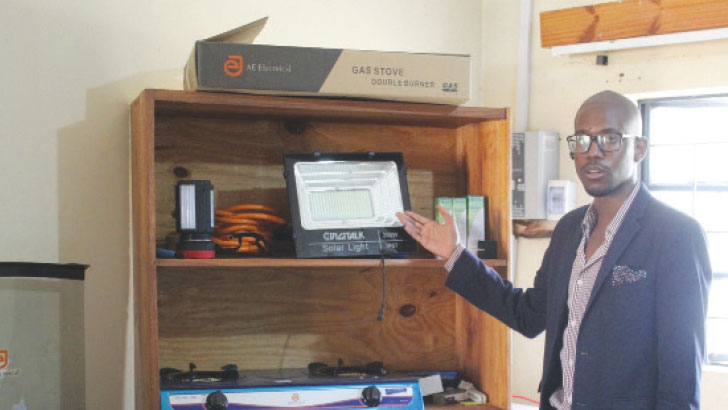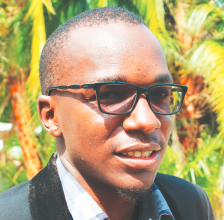Low awareness slows uptake for alternatives
TMbvundula shows some LPG productshere is a flourishing business in the energy sector, especially for those trading in sustainable cooking energies, but lack of awareness and government incentives is affecting the business that has the potential to reduce the high consumption of illegal charcoal and firewood.
Malawi is now home to a variety of smart cooking energies such as liquidified petroleum gas (LPG), sustainable charcoal and briquettes, just to mention some. For example, government targets to increase access to LPG by three percent by 2023.
The Malawi Energy Regulatory Authority (Mera) has not only removed value-added tax (VAT) on LPG, but has also significantly slashed license fees to lure more players to participate in this industry.

For those operating retail filling of gas, the licence fee has been reduced from K500 000, to only K50 000; and wholesale licence has dropped from K1.5 million, to only K200 000.
Even with the newly increased price of gas, Mera’s estimations still show that it is relatively cheaper using gas than other forms of energy—a claim that collaborates with our findings based on interviews with suppliers and users of the product.
“For a family of four, a kilogramme of LPG (K2 065) can last five days. Consumers cannot get the same value from charcoal worth K2 065. Consumers will still see savings in their energy bill when they use LPG,” says Mera public relations manager Fitina Khonje.
We followed and interviewed three Lilongwe-based households that use LPG and they all confessed it was cost-effective compared to both electricity and charcoal, but complained of access as a major drawback.
Tired of unreliable electricity supply, a Lilongwe-based resident, who declined to be named, switched to gas three years ago and he counts more benefits than trouble.
“I noticed that that when using electricity for cooking, grilling and heating using the same microwave, K30 000 units would not last us a month, yet gas of the same amount (K30 000) lasts close to 50 days. Actually, even when you factor in transport or consider how cumbersome it is to walk with a gas canister, it is still cheaper,” explains the resident.
Speaking to suppliers—they are also talking of how cost-effective the alternatives are, but indicate that the customer base remains low; not only on account of money, but lack of information and access to the products.
Founder and chief executive office for 265 Energy, Fundo Mbvundula, says main challenges are that even those that are economically able shun gas based on misinformation, urging government to create more awareness. He says the other reason people avoid gas for charcoal is an issue of availability.
“You talk of a six-kilogramme cylinder, which when filled weighs about 15 kilogrammes, and someone has to travel a distance. So, if they have no car, surely this is a drawback. So, we have introduced a door-to-door service, which many find convenient,” says Mbvundula.
He adds that there are also perceived safety concerns on use of gas such that they make it a point to train all their clients on use of gas cookers.
Gas selling outlets are more prevalent in cities—which already excludes many from accessing this important alternative source of energy.
The price of appliances is another drawback for others from using the smart technology. A snap check of gas cookers, depending on plates, fetch between about K20 000 to over K200 000, and what makes them expensive is the value added tax which industry players are lobbying for removal.
Lecturer in energy sciences and head of energy department at the Malawi University of Science (Must) Dr. John Taulo is not optimistic that government will increase access to LPG to three percent in two years’ time adding that there is need to have the product locally produced to make it both affordable and accessible to many including rural areas.
“LPG is not adequately available in rural areas, where majority (84%) of the population live. In addition, LPG is very expensive. As a country, we need to start producing LPG locally to make it cheaper” argued Taulo who cautions government to tread carefully when determining price for such products arguing that the recent hike in price of LPG is counterproductive and promotes inequality and energy injustice.
Sustainable charcoal makes inroads…
Kawandama Hills had become the first one, in 2015, to be licensed as a sustainable charcoal producer in Malawi and currently has a number of outlets in urban areas which include supermarkets where they sell their charcoal.
“This charcoal is far much better than the illegal charcoal because our production is carefully done; we grade the charcoal and we use quality wood so that it is not harmful to human health like the illegal charcoal produced anyhow” claimed the sales lady, Caroline Mkandawire, in a typical business style meant to lure a new customer. She sells Kawandama Hills sustainable charcoal at one of the outlets in Lilongwe.
Mkandawire claimed that her family of five uses about 15 kilogrammes for two weeks for daily cooking at only about K4 000.
“You can ask the owner of this restaurant on how good our charcoal is” she added “they use our charcoal and they have never complained” she stressed as if her own testimony did not carry weight.
Next to her container is an eatery which attracts a sizeable group of customers. Surely, at this eatery, the sight of charcoal was too visible to be ignored.
“The charcoal does not take time to catch fire and even if it got wet it will quickly dry. It has no smoke—making it a smart cooking energy,” said Karen Nyasulu, the owner of the restaurant.
We interviewed some customers we found buying the sustainable charcoal at some outlets for Kawandama Hills and out of five, four cited cost and efficiency as what motivates them to use the sustainable charcoal. One talked about environmental reasons.
“You buy a 15-kilogramme bag at K4 000 and what you get is quality charcoal which burns without smell and irritating smoke. In fact the illegal charcoal would weigh heavier because of dust and wood yet does not burn efficiently. I stopped using it” said one lady customer.
Apart from the charcoal, there is also an increase in production of briquettes, but still the uptake remain low. According to Richard Mlotha, a Lilongwe based briquette manufacturer there is a lot of expertise in making quality briquettes but the demand is lower compared to capacity of production.
Mlotha said their production can significantly go up if there is more demand. While he tries to market his own product, he feels it would help to have government do it—to make the “message more credible”.
The lack of awareness questions government’s seriousness to live up to its own policy dictates to promote sustainable sources of energy. n





